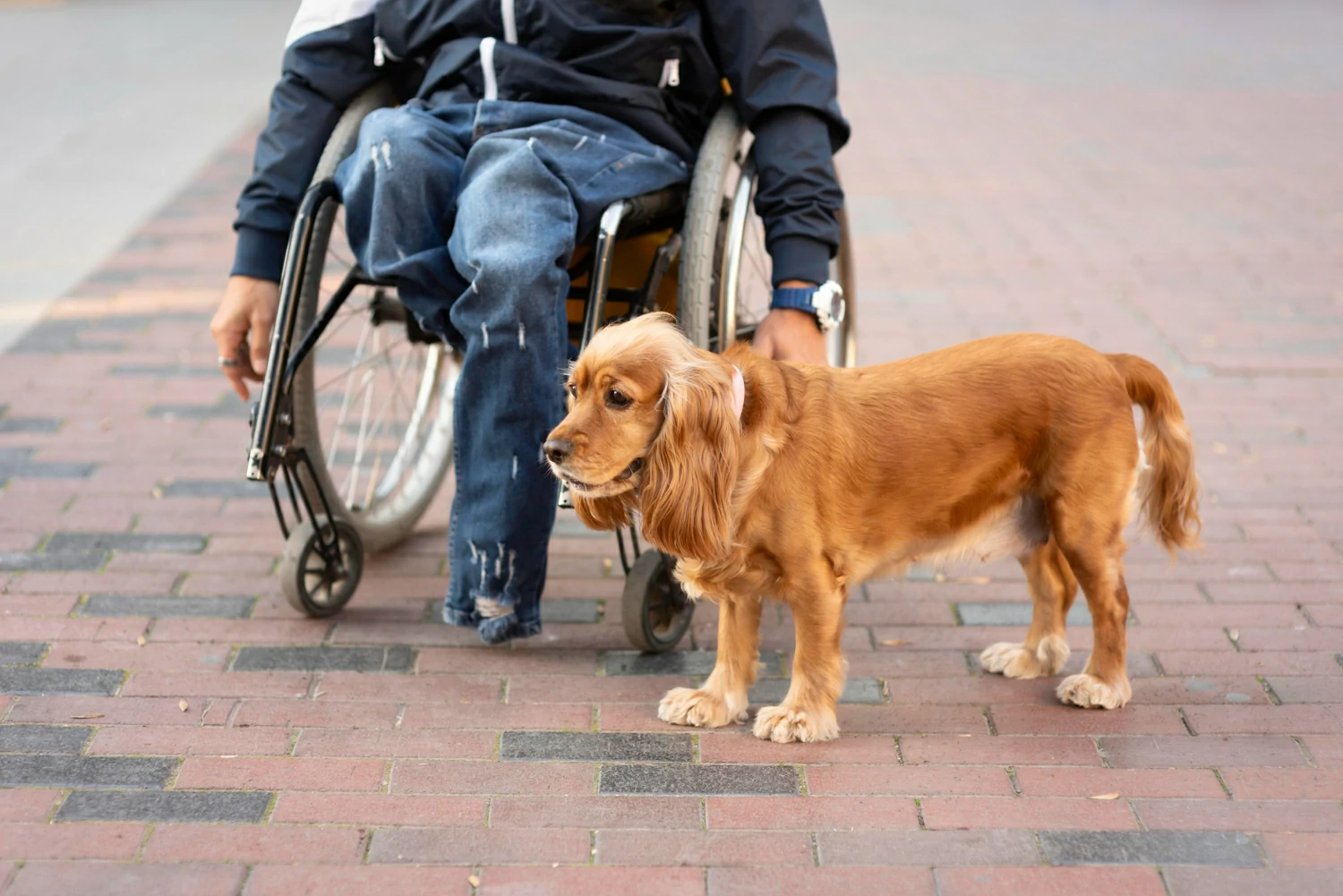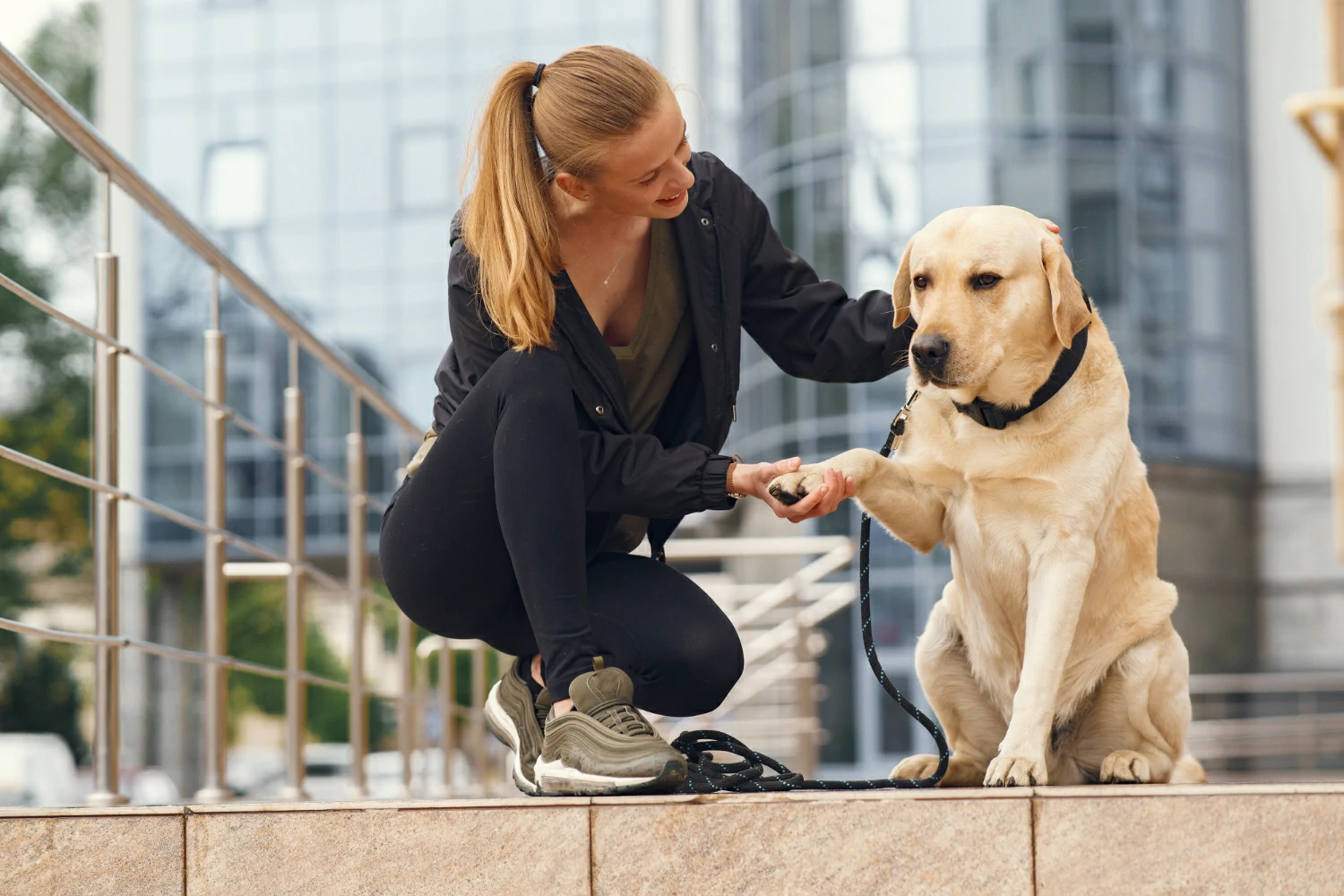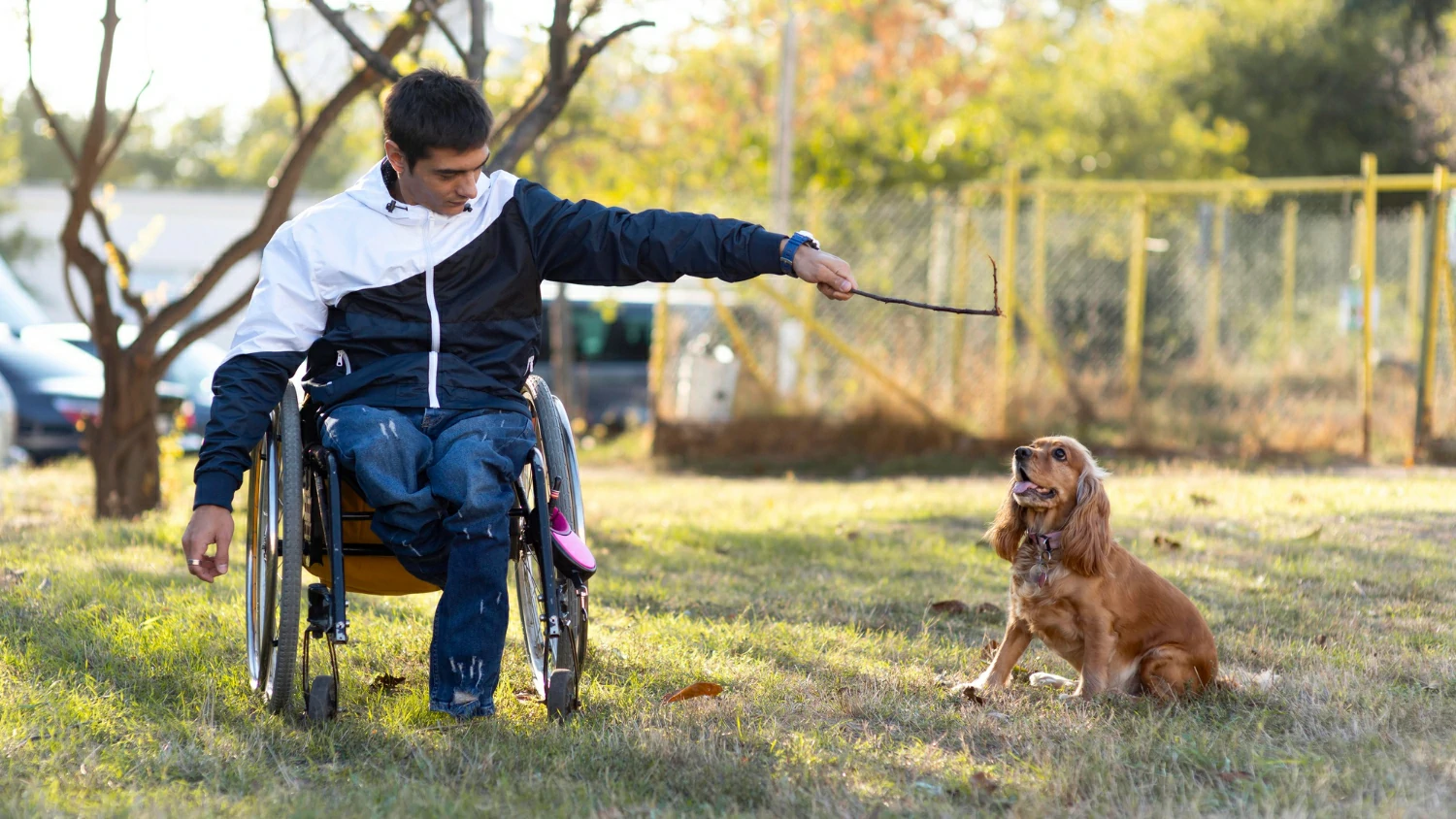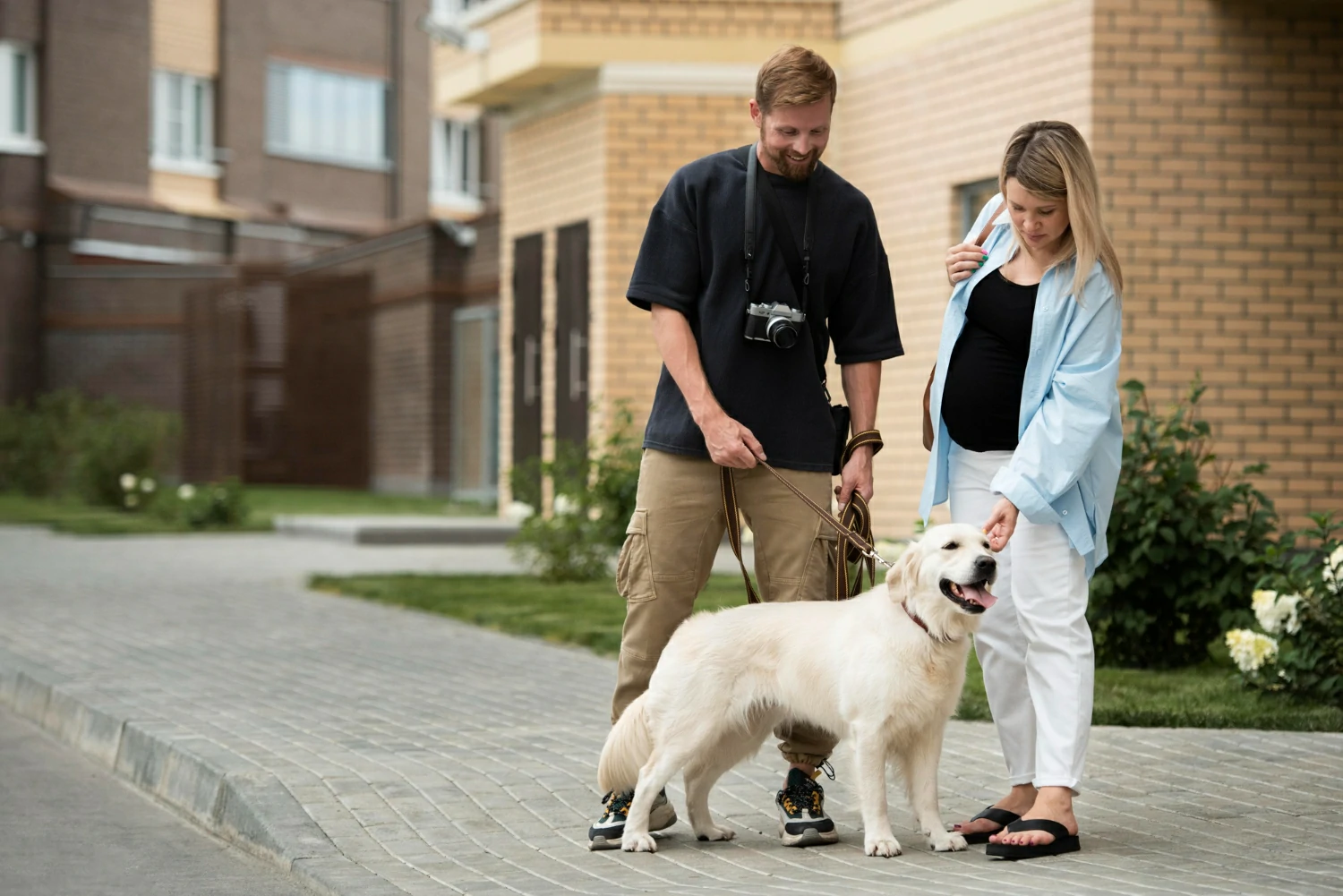Can hotels charge for service dogs? Answer is – No, hotels cannot charge additional fees or deposits for service dogs. Under the Americans with Disabilities Act (ADA), service dogs are considered essential medical equipment and not pets. They must be allowed to accompany their handlers in all areas of a hotel where the public is permitted. However, hotels can charge for any damages caused by the service dog.
Summary
- Service dogs are protected under the Americans with Disabilities Act (ADA).
- Hotels cannot charge additional fees for guests with service dogs.
- Service dogs must be allowed in all public areas of the hotel.
- Owners are responsible for any damages caused by their service dog.
- There are specific questions hotels are allowed to ask about the service animal.
Can Hotels Charge for Service Dogs?

What is a service dog?
A service dog is a dog specifically trained to perform tasks that directly mitigate their handler’s disability. These tasks go beyond simple companionship or emotional support. Service dogs offer life-changing independence to individuals with a wide range of disabilities, including:
- Physical Disabilities: Retrieving objects, opening doors, providing balance support, guiding people with visual impairments.
- Sensory Disabilities: Alerting people with hearing impairments to important sounds, signaling oncoming seizures for individuals with epilepsy.
- Psychiatric Disabilities: Providing grounding techniques during anxiety attacks, interrupting harmful behaviors for people with PTSD, offering deep pressure therapy.
Service dogs undergo extensive training, often taking up to two years, to ensure they can reliably perform their tasks and remain well-behaved in public settings. They represent a significant investment in both time and resources.
The importance of service dogs for people with disabilities
Service dogs offer a level of support and independence that can be transformative for people with disabilities. Here’s why they’re important:
Increased Independence: Service dogs allow their handlers to accomplish tasks they might otherwise struggle with, reducing reliance on others and increasing self-sufficiency.
Improved Safety: Service dogs can alert their handlers to medical emergencies, navigate dangerous environments, and even call for help in some situations.
Enhanced Mental Health: The companionship and support of a service dog can significantly reduce anxiety, depression, and isolation for people with disabilities.
Social Integration: Service dogs can act as a bridge for people with disabilities, facilitating social interaction and reducing stigma.
Dr. Sarah Bennett Expert Opinion
“Service dogs are more than just pets; they are essential lifelines for many people with disabilities,” states Dr. Sarah Bennett, a certified dog trainer specializing in service dog placement. “They provide not only practical assistance but also invaluable emotional support and companionship.”
Can Hotels Charge for Service Dogs?

The short answer is no. Hotels in the United States cannot charge extra fees or deposits for guests who require the assistance of a service dog. This protection is clearly outlined in the Americans with Disabilities Act (ADA).
1. Understanding the Americans with Disabilities Act (ADA)
The ADA is a landmark piece of civil rights legislation that prohibits discrimination against individuals with disabilities in all areas of public life, including places of public accommodation like hotels.
Under the ADA, service dogs are not considered pets. They are classified as essential medical equipment, much like a wheelchair or prosthetic device.
The ADA mandates that hotels must allow service dogs to accompany their handlers in all areas where the public is generally allowed. This includes:
- Guest rooms
- Lobbies
- Restaurants
- Meeting rooms
- Swimming pools and fitness centers
2. Hotel policies and service dog fees
While hotels cannot charge specific “service dog fees” they are well within their rights to maintain general pet policies. Therefore, it’s important for service dog handlers to be aware of the hotel’s existing policies regarding pets before booking a stay. This information is usually available on the hotel’s website or can be obtained by calling them directly.
It’s also important to note that service dogs must be housebroken and under the control of their handler at all times. Hotels are allowed to ask the following two questions according to the ADA:
- Is this a service animal required because of a disability?
- What task or work has the animal been trained to perform?
Hotels cannot ask about the nature of the handler’s disability or demand proof of certification or special identification for the dog.
3. Exceptions: Damages caused by the service dog
The ADA’s protection does not provide a blank check for service dogs. If a service dog causes damage to hotel property, the hotel is permitted to charge the handler the same fees they would charge any other guest for similar damages.
These charges should be itemized and reasonable. Examples of situations where a charge might be deemed necessary include:
- Excessive soiling or damage to a hotel room that requires specialized cleaning or repairs beyond normal use.
- The service dog displaying disruptive or aggressive behavior that poses a threat to other guests or staff.
Emily Taylor Expert Opinion
“While the ADA provides clear guidelines, it’s still important for service dog handlers to be proactive,” advises Emily Taylor, a disability rights attorney. “Contacting the hotel in advance to inform them about your service dog can help ensure a smooth and pleasant stay for everyone involved.”
Your Rights as a Service Dog Handler

The Americans with Disabilities Act (ADA) not only ensures service dogs have access to hotels but also protects the rights of individuals with disabilities who rely on them.
Understanding these rights is crucial for advocating for yourself and your service dog when traveling or simply accessing public spaces.
1. What hotels can and cannot ask
The ADA places strict limits on what questions hotel staff can ask about your service dog. Remember, they are only allowed to ask two specific questions:
Is this a service animal required because of a disability? Hotels cannot ask about the specific nature of your disability.
What task or work has the animal been trained to perform? Hotels cannot demand demonstrations of the service dog’s tasks.
Prohibited Questions and Actions
Hotels are NOT allowed to:
- Ask for documentation or proof of your disability
- Require that your service dog wear a vest, ID tag, or specific harness
- Charge additional pet fees or “service dog” fees
- Deny access to any area of the hotel where the public is generally allowed
- Separate you from your service dog
- Treat you differently than other guests due to the presence of your service dog
2. How to handle improper questioning or denial of access
Unfortunately, despite the ADA’s protections, service dog handlers sometimes encounter misunderstandings or even discrimination in hotels. Here’s how to handle such situations:
Remain Calm and Informative: If a hotel staff member asks inappropriate questions or denies you access, try to stay composed and educate them about the ADA’s regulations. You can politely reference the ADA’s website or provide them with a printed information card.
Request to Speak to a Manager: If the staff member remains uncooperative, ask to speak to a hotel manager or supervisor who may have better knowledge of the ADA.
Document the Incident: If you experience continued discrimination, it’s helpful to document the incident in detail. Note the date, time, location, names of the staff involved, and a description of the events.
File a Complaint: You have the right to file a complaint with the Department of Justice if a hotel violates the ADA’s provisions regarding service dogs.
Dr. Rebecca Johnson Expert Opinion
“Knowledge is power,” emphasizes Dr. Rebecca Johnson, a specialist in disability law. “Service dog handlers who are well-versed in their rights under the ADA are better equipped to navigate potential challenges confidently and advocate for themselves.”
Responsibilities of Service Dog Handlers

The partnership between a person with a disability and their service dog is built on mutual trust and respect.
As a handler, you have an obligation to ensure that your service dog enhances, rather than disrupts, the experience of others within a hotel setting.
1. Ensuring your service dog is well-behaved and under control
Service dogs are expected to meet high behavioral standards in public settings. This means:
Basic Obedience: Your service dog should reliably respond to basic commands like “sit,” “stay,” “down,” and “heel.”
Focus: Your dog should remain focused on you and their tasks, even in the presence of distractions such as other guests, noises, or food.
Non-Disruptive Behavior: Service dogs should not bark excessively, jump on people or furniture, sniff guests inappropriately, or solicit attention from others.
Leash or Harness: In most cases, service dogs must be under control of a leash or harness unless this interferes with the dog’s ability to perform their tasks.
If your service dog demonstrates disruptive behaviors, a hotel may be justified in asking you to remove them from the premises. Consistent training is key to ensuring that your service dog acts as a well-mannered ambassador in public spaces.
2. Cleaning up after your service dog
Just like any dog owner, service dog handlers are responsible for cleaning up after their dogs. This includes:
Potty Breaks: Take your service dog to designated relief areas outside the hotel and promptly dispose of any waste in appropriate containers.
Accidents: If an accident occurs indoors, alert hotel staff immediately and assist with cleanup if possible.
Shedding: While hotels should be prepared for some level of pet hair, excessive shedding can be an issue. Regular grooming can help minimize this.
3. Respecting hotel property and other guests
Service dog handlers should strive to be considerate guests for the comfort and safety of everyone at the hotel. This involves:
Damage Prevention: Ensure your service dog does not scratch furniture, chew on fixtures, or cause any other damage to the hotel room or common areas.
Noise Control: Address any barking or whining from your service dog promptly to avoid disturbing other guests.
Consideration of Others: Be mindful of other people’s space and allergies. If possible, position yourself and your service dog discreetly in restaurants or public areas.
Lisa Freeman Expert Opinion
“Proactive communication with hotel staff can go a long way,” advises Lisa Freeman, a certified professional dog trainer with experience in service dog work. “Informing the hotel about your service dog and addressing any potential concerns upfront can make the stay more enjoyable for everyone.”
Additional Considerations

1. Service Dogs on International Travel
Traveling with a service dog internationally adds a layer of complexity. Each country has its own regulations and requirements regarding the entry of service animals. Here’s what you need to know:
Research is Key: Before booking any international trip, thoroughly research the specific regulations of your destination country. Contact their embassy or consulate in the United States for the most up-to-date information.
Documentation: You may need to provide additional documentation, such as proof of your service dog’s vaccinations, health certificates, or specialized training certifications.
Quarantine Requirements: Some countries may impose quarantine periods for incoming animals. It’s essential to factor this into your travel plans.
Airline Policies: Airlines may also have their own requirements for service dogs on international flights. Contact your chosen airline well in advance to understand their policies.
2. Emotional Support Animals (ESAs) vs. Service Dogs
It’s important to understand the distinction between service dogs and emotional support animals (ESAs) as they have different rights under the law.
ESAs: Emotional support animals provide comfort and companionship to individuals with mental or emotional disabilities. However, they are not task-trained and do not have the same public access rights as service dogs.
Changing Regulations: In recent years, airlines have tightened regulations surrounding ESAs due to abuse of the system. Hotels are not required to accommodate ESAs under the ADA.
3. Resources for further information
Here are some reliable resources to get more in-depth information about service dogs and related topics:
The Department of Justice ADA Website: The official source for information about the Americans with Disabilities Act, including frequently asked questions about service animals.
Service Dog Central: A comprehensive website offering resources, training tips, and advocacy information for the service dog community.
The International Association of Assistance Dog Partners (IAADP): An organization dedicated to setting standards for assistance dogs, including service dogs.
Sarah Marshall Expert Opinion
“Understanding the regulations, both domestically and internationally, is crucial for any service dog team,” emphasizes Sarah Marshall, an attorney specializing in animal law. “Being prepared and informed is the best way to ensure smooth travels and advocate for your rights.”
Conclusion
Service dogs are not simply pets; they are vital partners for individuals with disabilities. Understanding the rights and responsibilities associated with service dog ownership is essential for ensuring that these canine companions can perform their important work without unnecessary obstacles.
Advocacy is Key: By advocating for your rights under the Americans with Disabilities Act, you help raise awareness and break down barriers for the entire service dog community.
Positive Representation: Responsible and well-behaved service dogs in public settings act as ambassadors, helping to change perceptions about disability and the incredible contributions these animals make.
Continuing Education: Staying informed about any changes to regulations or best practices regarding service dogs empowers both handlers and businesses to create more inclusive environments.
FAQs
Q: Can I be asked to leave a hotel because of my service dog?
Generally, no. Hotels cannot ask you to leave solely because of the presence of your service dog. However, they may be justified in asking you to remove your dog if it is out of control, causing damage, or posing a direct threat to others.
Q: What should I do if a hotel employee tries to deny me access with my service dog?
Remain calm, educate the staff member about the ADA, and request to speak to a manager. If necessary, you can document the incident and file a complaint with the Department of Justice.
Q: Do I need to provide documentation or certification for my service dog?
No. The ADA does not require special identification or documentation for service dogs. There’s no official registry of service dogs in the United States.
Q: Can hotels charge different rates for rooms designated as “pet-friendly?”
Yes, hotels may have designated pet-friendly rooms and charge accordingly. However, they cannot charge extra fees for service dogs, even in these rooms.
Q: Are there restrictions on the breeds of dogs that can be service dogs?
No, the ADA does not place any restrictions on the breed or size of a service dog. Any dog, regardless of breed, can be trained to perform tasks to assist a person with a disability.







